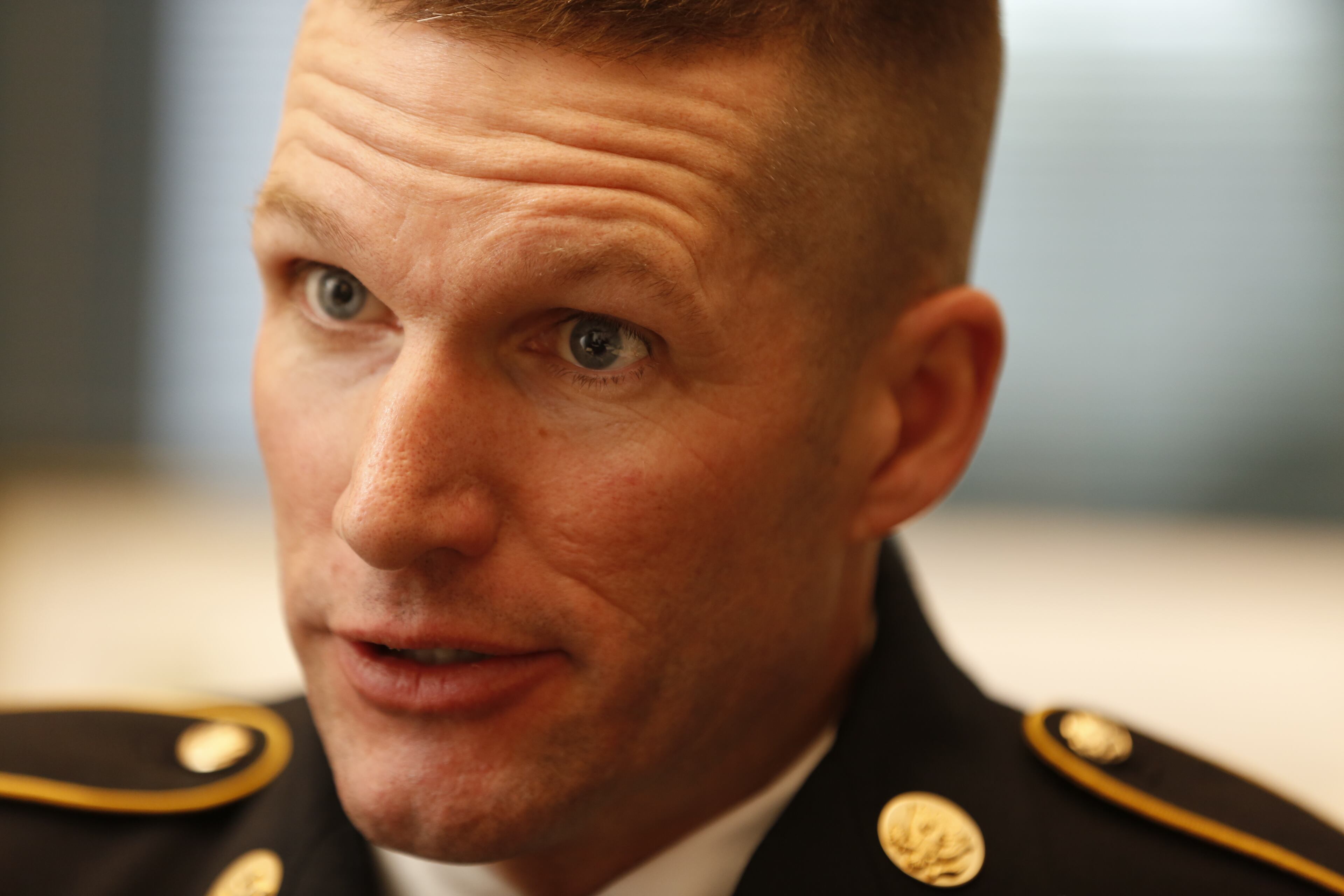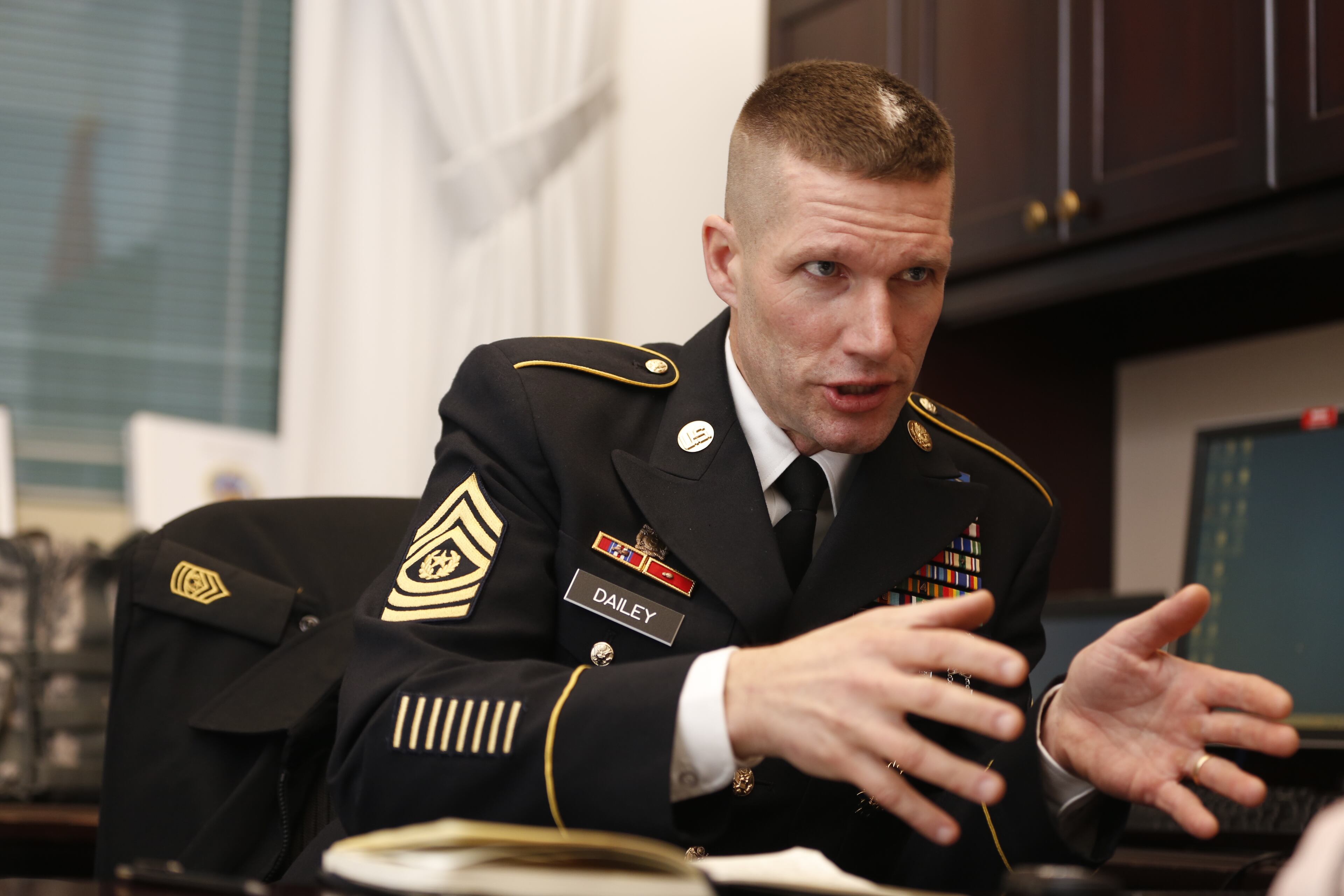All Sergeant Major of the Army Dan Dailey ever wanted to be was a soldier.
"I haven't forgotten that's who I am," said Dailey. "I'm a soldier. I have the same level of authority as any other noncommissioned officer in the United States Army, and I still have the same basic responsibilities and duties to uphold every single day as they do, and that's my promise. I'm not going to forget that."
Dailey, 42, was sworn in Friday as the 15th sergeant major of the Army. He succeeds Sergeant Major of the Army Raymond Chandler, who is retiring after 34 years of service.
Dailey is the youngest soldier to ever serve as the service's top enlisted soldier, and his selection still hasn't completely sunk in, he said.
"The first day you walk into the Pentagon and you realize you actually have orders to the Pentagon, that's something you don't think about as a soldier," he said.
Dailey, who most recently was the command sergeant major of Training and Doctrine Command, said he has had some time to prepare for his newest assignment,
"The chief of staff of the Army has invested a lot of time in making sure there was ample time to allow me to get all the briefings before becoming the sergeant major of the Army," he said. "It's been a valuable time. It really opens your eyes. It's amazing what the Army staff does."
Some of the issues he has been briefed on include current operations, the ongoing drawdown, the potential impacts of sequestration, and how the Army is preparing for the future, he said.
"I'm getting a good sense on where we stand, where we know we're going, and the unknowns and determinations that have to be made by our great civilian leaders," Dailey said. "It's really been a beneficial time, and a lot of information in a very short amount of time."

Sergeant Major of the Army Dan Dailey, 42, is the youngest SMA ever.
Photo Credit: Mike Morones/Staff
Dailey already is preparing for a high-profile event: his first Congressional hearing.
Dailey and the other senior enlisted advisers from the other services are slated to testify in front of Congress in late February.
"I think Congress appreciates the opportunity to talk to us," he said. "We're giving them the soldier's perspective on all the topics important to them. I think it's critical not only for them but for our soldiers, airmen, sailors and Marines to see that they have the senior representation. That's a big part of being the sergeant major of the Army, being able to represent our soldiers even to the highest levels of our civilian leaders."
Chandler said he is confident Dailey will do "extremely well."
"He's the right man at the right time for the job," Chandler said. "I'm very proud of him. I met him first in Iraq in 2012. I've known him ever since then, and he will do a phenomenal job, and I'm proud to be turning it over to him. He'll do well. He'll do better than I did."
As he settles into his new assignment, Dailey already has a set of initiatives based on Army Chief of Staff Gen. Ray Odierno's priorities.
They are:
Developing adaptive leaders
"The chief's priority is adaptive leaders for a complex world," Dailey said, adding that he plans to continue the work that has been done at TRADOC.
At the top of that list is enlisted professional military education and some sweeping changes that will come out of the NCO 2020 effort, he said.
"Nothing in the Army happens without leadership," he said. "We are not a materiel service. Nothing against the other services, but we don't have the big boats, we don't have the airplanes, but what we do have is people."
Investing in those people is an investment in leadership, Dailey said.
"Nothing happens unless we have good leaders, so we need to continue to improve that for our soldiers," he said. "I think we've made improvements, but there's still a lot of work that needs to be done."
Maintaining a globally responsive, regionally engaged Army
"Our soldiers recognize today we're going to have to continue to have to deploy into what is the unknown," Dailey said. "We've become that capable force that is globally responsive, but it's something we need to maintain."
This includes maintaining a ready and modern Army, Dailey said.
"From the perspective of where soldiers need to focus on is unit readiness and training," he said. "Our noncommissioned officers have always been the bedrock of training soldiers on what they need to do to perform their basic responsibilities and collective tasks on the battlefield, and I need them to continue to focus on that."
The Army also must harness the combat experience of these NCOs, Dailey said.
"We need to capitalize on the lessons they've learned over the last 12 or 13 years of war because when we lose that generation of leaders, because we will over time, we can't lose that skill set," he said. "Our noncommissioned officers need to know they need to pass it on, because they are the value right now. They are the lessons learned, and they are the encyclopedias of information."
The Army profession
"Every soldier out there is a strategic communicator, and we've seen, unfortunately, some bad examples of that," Dailey said. "A soldier does something wrong, and it's tough. It's tough because the expectation of the American public is we live at a higher standard."
The Army must continue to work on issues such as sexual assault and harassment prevention, Dailey said.
"That's not a bumper sticker," he said. "Those things require maintenance over time."
Preserving the all-volunteer force
"The nation provides their sons and daughters to us," Dailey said. "We have to live the Army values, and we have to provide a place people want to come."
One way to do that is to maintain the training level that the Army has maintained over the last 12 years of war, he said.

Sergeant Major of the Army Dan Dailey stresses the importance of daily PT.
Photo Credit: Mike Morones/Staff
"It's critically important that we communicate to the American public that we are their ultimate fighting force," he said.
As the Army moves forward with its goals, Dailey said he understands it won't be easy as the service deals with tightening budgets, increasing demands around the world and a shrinking force.
"I truly believe in the fundamental fact that when leaders embrace things and do things, change will happen throughout the Army," he said. "Everything in the Army requires leadership. You've got to get out, and you've got to communicate with soldiers"
A little bit of inspiration doesn't hurt, either, he said.
"In most cases, we have great soldiers and noncommissioned officers throughout our entire Army, and they know what to do, but sometimes a little inspiration goes a long way, too," Dailey said. "Showing you can show up there, still be a soldier, lead from the front, take them out for unit runs, those little things have huge impacts over time."
Dailey, who is a veteran of Operations Desert Shield and Desert Storm and who has deployed four times to support Operation Iraqi Freedom and Operation New Dawn, said he understands soldiers and their families are worried about the ongoing drawdown and all the change that is happening around them.
"Very understandably, it should be a focus on their minds," he said. "It's important to realize that we are going to get smaller. It's something we've done historically after every major war. But we also have requirements for the defense of the nation."
And soldiers need to know that there's room in the Army for those who should stay in uniform, Dailey said.
"We can only take a standards-based approach to a downsizing Army," he said. "That's the right thing to do by our soldiers, that's the right thing to do by our leaders, it's most surely the right thing to do for the American public."
It all comes down to leadership, Dailey said, including when it comes to issues such as appearance, tattoos and social media.
"I've always said that you can run around and spend your entire day telling soldiers to police up trash, but if you lead them to police themselves, your post will be clean," he said. "Excellent leadership occurs when a soldier walks by another soldier and says 'hey, you need to pick that up.' That's really what I want to do. I want to put the responsibility in noncommissioned officers' hands."
Dailey said he has faith in these young NCOs.
"I fought with these young men and women for the last 12 years," he said. "They have the knowledge, skills and attributes to continue to be just as fine leaders as they've been these last 12 years on the battlefield."
It's been a tough 12 years, Dailey said.
"The sacrifices made by soldiers, the sacrifices made by families, and now we're telling them, 'hey, we're going into a time where we're going to have limited resources, we may have to downsize, I'm sure you heard there's a commission report on pay and allowances,'" he said. "They have a right to be concerned, and they have a right to ask questions. But they also have a responsibility, the same level of responsibility they had defending the nation these past 12 years in war. That is to maintain the trust, maintain the professionalism and the honor of being a United States Army soldier and supporting the leadership in that mission."
The challenges ahead also will bring opportunity, Dailey said.
"Noncommissioned officers are going to have time to train their soldiers, something they were short on these last 12 years of war," he said. "There are opportunities for self-development and also capitalizing on some of the great gifts the American public has given us, things like tuition assistance."
Dailey said he looks forward to traveling across the Army and meeting with and hearing from soldiers and their families.
If he had a message to send to them today, however, it's simple, he said.
"I would tell them that we're OK," Dailey said. "We're doing just fine, and I truly believe that. I have had the benefit, no, I have had the honor of working with these young men and women for the last 12 years, side-by-side, in complete awe, watching how they perform on the battlefield. I'm excited about the future."
And one more word from Dailey: do PT.
"What I tell soldiers is the first thing to do to get every day right is to get 6 to 9 [a.m.] right, and that's PT," he said. "It might not be the most important thing you do that day, but it is the most important thing you do every day. Because a soldier who's physically fit will look and feel like a soldier, and if you look and feel like a soldier, you'll act like a soldier. I like to keep it simple. I'm just an infantryman."
Michelle Tan is the editor of Army Times and Air Force Times. She has covered the military for Military Times since 2005, and has embedded with U.S. troops in Iraq, Afghanistan, Kuwait, Haiti, Gabon and the Horn of Africa.





